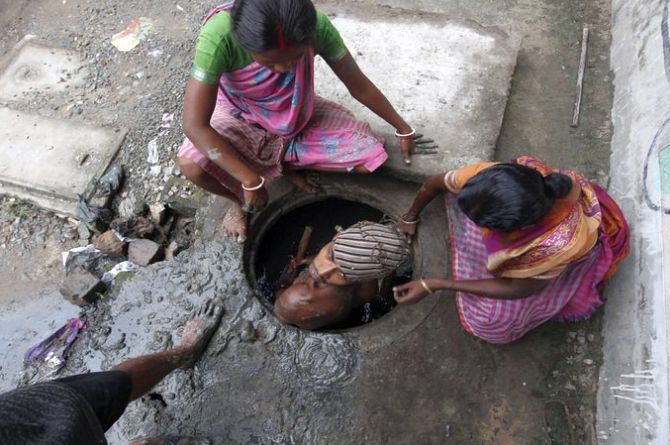While India is going in a great path towards becoming digital India there are some things which are shame to our nation.
One of it is the manual scavenging.
Manual scavenging is a caste-based occupation involving the removal of untreated human excreta from bucket toilets or pit latrines that has been officially abolished by law as a dehumanizing practice.
It involves moving the excreta, using brooms and tin plates, into baskets, which the workers carry to disposal locations sometimes several kilometres away.
The workers, called scavengers, rarely have any personal protective equipment.
According to socio-economic caste census of India 2011 released in 2015, there are more than a lakh people who are identified as manual scavengers. They don’t have any proper equipment’s and they are exposed to deadly diseases and infections.
Rediff labs analysed the socio-economic caste census 2011 data on number of manual scavengers in India.
The map above shows the number of manual scavengers in each district of India.
The top five districts with high number of manual scavengers are Jalna, Yavatmal, Solapur of Maharashtra, Daman and Diu and Amritsar of Punjab.
Out of 630 districts for which we have the data, 149 districts have no manual scavengers and the remaining 484 districts of India have at least one manual scavenger.
The government has taken steps to eradicate manual scavenging in India.
In 1993, the central government framed a law, the employment of manual scavengers and construction of dry latrines (prohibition) act.
Drafted by the ministry of urban development under the Narasimha Rao government, the law was passed by parliament in the same year.
According to the act the employment of scavengers or the construction of dry (non-flush) latrines faces imprisonment for up to one year and/or a fine of Rs 2000.
For the rehabilitation of manual scavengers in the year 2013 another act was passed and according to that act the following benefits are provided:
- Onetime cash assistance of Rs.40000 to identified manual scavengers.
- Loans for project cost up to Rs. 15 lacs on concessional rates of interest.
- Credit linked back-end capital subsidy up to Rs. 3, 25,000.
Skill Development Training up to two years with stipend of Rs.3000/- per month.
Even after all the initiatives by government still the manual scavenging is in practice in many places of India.
The biggest violator of the prohibition law is the Indian Railways where many train compartments have toilets dropping the excreta from trains on the tracks and it employs scavengers to clean the tracks manually.
In order to become a great nation first we need to eradicate the worst surviving symbol of untouchability -- manual scavenging.












 © 2025
© 2025